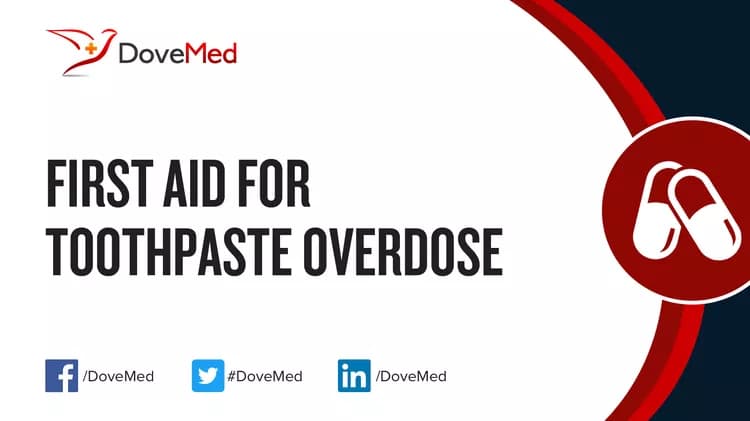What is Toothpaste Overdose?
- The toothpaste can be described as a complex compound of several ingredients including triclosan (antibacterial agent), sodium lauryl sulfate, fluoride, diethanolamine, propylene glycol, abrasives, and artificial sweeteners
- Toothpaste Overdose is the accidental swallowing or intentional intake of toothpaste in large quantities. This condition is generally observed in children
- The condition is diagnosed based upon the clinical history, combination of signs and symptoms, and additional tests (that may include, in some cases, radiological studies and laboratory tests)
What are the Causes of Toothpaste Overdose?
- Toothpaste Overdose is caused by the intake or ingestion of toothpaste greater than the recommended values
- This intake could be accidental, or in some cases intentional, to bring self-harm
- Toothpastes are available in the form of gels and pastes (and even in powder form)
- In toothpaste, the toxic components may include triclosan and sodium fluoride. Though many toothpastes contain fluoride, some toothpastes are available without fluoride in them
What are the Signs and Symptoms of Toothpaste Overdose?
The signs and symptoms of Toothpaste Overdose can vary from one individual to another. It may be mild in some and severe in others. The common signs and symptoms may include
- Stomach pain
- Burning sensation in the food-pipe
- Obstruction of the intestines
Additionally, ingestion of large amounts of fluoride-based toothpastes may result in:
- Drooling, vomiting
- Distastefulness (taste of salt or soap in the mouth)
- Breathing difficulties
- Decreased heart-rate; heart attack
- Lethargy and weakness
- Shaking or tremors; seizures
- Shock
How is First Aid administered for Toothpaste Overdose?
First Aid tips for Toothpaste Overdose:
- If the individual with Toothpaste Overdose is in a shock, or is experiencing life-threatening symptoms, call 911 (or your local emergency help number) immediately
- Call the Poison Control Center at 1-800-222-1222 (or your local poison control center) for further instructions
- Provide them with information such as the type of toothpaste taken, time of ingestion, age, weight and general health status of affected individual
- Confirm that the airways are protected; also, ensure breathing and the presence of pulse
- Clean the mouth to remove any remaining traces of toothpaste; wipe mouth with a wet cloth
- Unless instructed by a healthcare professional, DO NOT induce vomiting in the affected individual
- Otherwise, following an ingestion of the substance, immediately give milk or water to drink (or a snack)
- In case of symptoms that indicate difficulty in swallowing including vomiting or decreased alertness, do not give anything by way of mouth
- If eye exposure has occurred, then wash the eye thoroughly with copious amounts of water (for about 15 minutes)
- Take individual to emergency room (ER) for further treatment
- Always try to take the toothpaste tube/container to the ER
The emergency medical health professional might perform the following steps towards treating the condition:
- Gastric lavage for elimination of drug from the stomach (irrigation using special solutions)
- Medically manage symptoms, such as abnormal heart rate and seizures
- Provide breathing support, if necessary
- Administer activated charcoal to avoid absorbance of toothpaste in the body
- Administer calcium to counter the effects of the substance in the body
- Administer fluids by an intravenous drip line
- Wash eyes repeatedly and thoroughly (irrigation), to eliminate any remaining compound
Who should administer First Aid for Toothpaste Overdose?
First aid for Toothpaste Overdose is administered by healthcare professionals.
- The individual who overdosed, or someone near, should call 911 for emergency assistance (or the local emergency number)
- They should also call the poison control center at 1-800-222-1222 (or the local poison control center) and follow instructions
What is the Prognosis of Toothpaste Overdose?
- The prognosis of Toothpaste Overdose is dependent on the amount of toothpaste consumed, time between overdose and treatment, severity of the symptoms, as well as general health status of the patient
- In many cases, hospitalization may not be necessary (for both children and adults), if substantial amounts of a non-fluoride based paste is swallowed. Non-fluoride toothpastes are typically harmless and non-toxic, even when significant amounts are swallowed
- In case of a fluoride toothpaste, if the individual can recover from the symptoms within a period of 2 days, with appropriate medication and support, the outcome is good. Children may need to be hospitalized, if fluoride-based toothpaste is swallowed in massive quantities
In general, overdoses are common situations in the emergency departments. A majority of the cases are often not fatal, when appropriate treatment is given.
How can Toothpaste Overdose be Prevented?
Toothpaste Overdose can be prevented by:
- Supervising young children on how much toothpaste to use and on how to brush one’s teeth
- Keeping cosmetics, medications, and other healthcare products out of reach of children in child-proof containers
- Be aware of basic first aid steps in case of an emergency (such as inadvertent poisoning)
What are certain Crucial Steps to be followed?
- Call 911 (or your local emergency number) for emergency assistance, if symptoms are life-threatening
- Call Poison Control Center at 1-800-222-1222 (or the local poison control center) and follow the recommend steps
- It would be helpful if the following information is readily available:
- Type, dosage and time of administration of medication
- Age and weight of the individual
- And, the overall health status of the individual
Related Articles
Test Your Knowledge
Asked by users
Related Centers
Related Specialties
Related Physicians
Related Procedures
Related Resources
Join DoveHubs
and connect with fellow professionals


0 Comments
Please log in to post a comment.